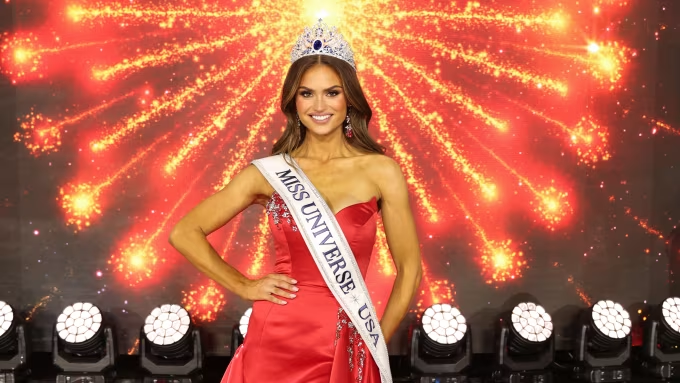Reno, Nevada — Under the bright lights of the Grand Sierra Resort, Nebraska’s Audrey Eckert was crowned Miss USA 2025 on Friday night, bringing a wave of optimism and renewal to a competition that has spent nearly two years trying to overcome scandal and controversy.
The 22-year-old digital safety advocate emerged victorious among 51 contestants, representing each state and the District of Columbia. Ivy Harrington of New Jersey and Chantéa McIntyre of Oregon finished as first and second runners-up respectively. The new Miss USA was overcome with emotion as golden confetti filled the stage, dropping to her knees in disbelief before being crowned by Miss Universe Victoria Kjær Theilvig — a symbolic gesture marking the pageant’s new beginning.
Unlike previous years, the reigning Miss USA did not crown her successor. Alma Cooper of Michigan, last year’s titleholder, was notably absent. Adding to the emotion of the night, Noelia Voigt, Miss USA 2023, returned to co-host the event — a surprise move considering the storm her resignation unleashed just 18 months earlier.
A Turbulent Journey Toward Redemption
Friday’s finale marked the end of one of the most turbulent chapters in the pageant’s 73-year history. The Miss USA organization had been reeling from internal disputes, leadership changes, and explosive allegations of misconduct since Voigt and Miss Teen USA UmaSofia Srivastava both resigned within days of each other in 2024.
Voigt’s resignation letter, which later became public, accused the organization of fostering a “toxic work environment” and poor management practices. She also alleged that she had been left without adequate protection during an official event, which led to an incident of sexual harassment. Although then-president Laylah Rose denied all allegations, the fallout fractured the organization’s credibility.
What made headlines even more was the cryptic resignation note Voigt posted on Instagram. Eagle-eyed users quickly discovered that the first letters of each of the first eleven sentences spelled out “I am silenced.” It sparked an online storm about restrictive non-disclosure agreements, leading to widespread criticism of how the organization handled its winners.
A Change in Ownership and a New Vision
In an effort to restore its reputation, the Miss Universe Organization transferred the Miss USA license earlier this year to American businessman Thom Brodeur, under a 10-year agreement. Brodeur, a beauty industry veteran and founder of Brodeur Beauty, now serves as the new president and CEO of Miss USA and Miss Teen USA.
The move came after months of lawsuits, counterclaims, and confusion. JKN Global Group — the Thai media conglomerate that owns Miss Universe — filed a lawsuit against Rose’s company, VVV Global, accusing it of mismanagement and damaging the Miss USA brand. VVV Global, in turn, filed a countersuit seeking over $116 million in damages and claiming breach of contract.
Despite the legal back-and-forth, Brodeur’s arrival is being viewed by many as a reset moment. Speaking to People magazine last month, he acknowledged the past controversies and expressed his commitment to giving future winners “a voice and a safe environment.” His first move, he said, would be to remove restrictive NDA clauses that silenced previous titleholders.
A Pageant of Inclusion and Evolution
This year’s competition wasn’t just about beauty and grace; it reflected the evolving face of modern America. For the first time in Miss USA history, there was no televised broadcast — the show streamed exclusively through a dedicated pageant platform, catering to a younger, more digital audience.
And in a powerful statement of inclusivity, age and marital restrictions were lifted. Women over 28, married women, and mothers were allowed to compete, signaling a dramatic cultural shift for an organization often criticized for outdated standards.
Among the historic contestants was 44-year-old Tetra Shockley of Delaware, the oldest competitor in Miss USA history. MonaLesa Brackett of New Hampshire also made headlines as the first woman to wear a hijab on the Miss USA stage — a bold symbol of diversity and representation.
The week-long event featured everything from state costume showcases to closed-door interviews. Miss Missouri Shae Smith won the national costume round, while the top 16 finalists were selected through a combination of judges’ scores and public voting.
Moments That Defined the Night
During the final Q&A segment, contestants were asked about a wide range of social topics, from artificial intelligence ethics to women’s representation in media. Eckert impressed the judges with her confident response about digital safety and online empowerment, drawing from her own advocacy background.
Her poise, authenticity, and composure ultimately set her apart — qualities that the judges and audience alike interpreted as a sign of a new, modern Miss USA.
The night also saw the crowning of Miss Teen USA 2025, Mailyn Marsh of Missouri, a 17-year-old aspiring dermatologist. Marsh’s win capped off a week celebrating not just beauty, but ambition, confidence, and empowerment among young women.
A Legacy Reclaimed
Founded in 1952, Miss USA has long been a symbol of glamour, ambition, and national pride. From Donald Trump’s ownership era (1996–2015) to the organization’s more recent corporate transitions, the brand has evolved alongside America’s changing values.
This year’s event — though smaller in scale and absent from traditional TV — felt more authentic and transparent than in recent memory. Viewers and former contestants took to social media after the show to praise the organizers for what they called “a graceful comeback.”
Audrey Eckert’s win seems to encapsulate everything the pageant now hopes to represent — intelligence, resilience, and empathy. As she prepares to represent the United States at Miss Universe 2025 in Thailand, she carries not just the hopes of fans, but also the weight of restoring trust in a storied institution trying to find its footing again.
Eckert’s first statement as Miss USA 2025 summed up that sentiment perfectly:
“This crown isn’t just for me,” she said. “It’s for every woman who ever doubted her voice. We are stepping into a new era where confidence means courage — not perfection.”

